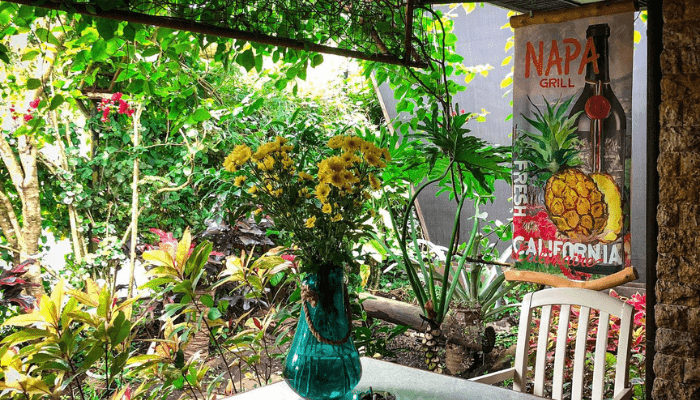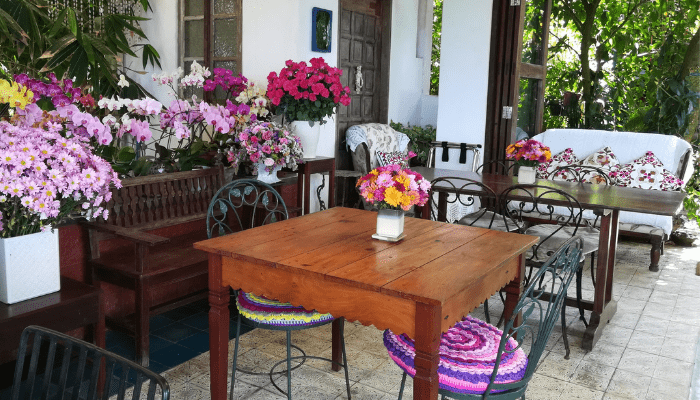 Al Fresco dining in the Philippines is the ‘in thing’ right now. Not only due to the Summer season but also, the unique limitations of our friend Covid-19!
Al Fresco dining in the Philippines is the ‘in thing’ right now. Not only due to the Summer season but also, the unique limitations of our friend Covid-19!
Tagaytay, at an altitude of 600-650m is the perfect spot to escape from Manila and quite literally, chill out. It is only a 60-80 minute drive from Makati. Here are the Top 5 family style, moderately priced restaurants with Al Fresco dining in Tagaytay:
1. FIRE LAKE GRILL

Arguably Tagaytay’s best steakhouse and only a few minutes’ drive from The Rotonda, Fire Lake Grill has unbeatable views over Lake Taal, and the Taal Volcano.
Hands on owner, Chef Paul Huang, is a very amiable chap.
Fabulous continental grill cuisine is on offer, (Meat/Fish/Pasta/Risotto/Salads, etc). Featuring a selection of wines from Zen Asia.
Fire Lake Grill has been consistently awarded as one of “The Philippines' Best Restaurants for 12 years running by Tatler Philippines.

Fire Lake Grill
Tagaytay Ridge Road
Unit 3 Cliffhouse Tagaytay
Tagaytay City, Cavite
Tel no: (046) 483-2069
Cell Phone no: 0927 914 4604
www.firelakegrill.com
2. NAPA GRILL

(Previously known as Don Limone)
Inspired by the beautiful wine growing region of northern California, Napa Grill is where the eclectic and farm fresh California cuisine meets the splendors of Tagaytay. You can find an abundance of locally grown produce, with a touch of Lebanese and Mexican influences.
Napa Grill is owned and managed by, Allen and Betty Tadayon; a very hospitable couple.
Created by a team of internationally experienced culinary professionals, Napa Grill's menu includes a wide range of fresh seafood and salads, grilled meats, and house baked breads. The Lebanese platter is superb!
Their large wine collection includes a great selection from Greece and Italy.
From the traditional wood burning fireplace to the romantic garden patio, Napa Grill offers a warm and rustic ambiance, for a memorable Tagaytay dining experience.

Napa Grill
1.1 km West of Mahogany
Market, 1.2 km West
For reservations call:
0932 873 2316 or 09175342568
facebook.com/donlimonegrill
3. Marcia Adams’ Restaurant

Owned and operated by Chef Marcia and her entertaining English husband Neil Adams. This garden-based Mediterranean restaurant and events venue is right on the edge of Tagaytay.
There are 6 dining locations around the garden, and all areas use natural ventilation. The menu includes dishes from around the Mediterranean including Spanish, French, Italian, Greek, Turkish and Moroccan cooking styles.
Complementing the home made food dishes is a range of fine wines from Zen Asia Inc.
Marcia Restaurant is also a magic venue for private functions, weddings and corporate events. When there are no special quarantine protocols in force, the restaurant can accommodate up to 200 guests.

Marcia Adams’ Restaurant
JP.Rizal St, Brgy Sikat, 4123 Alfonso, Cavite
Located along the border of Tagaytay and
Alfonso, Cavite, across Ville Sommet.
www.marciaadams.com
4. Breakfast at Antonio’s

If you love breakfast then Breakfast at Antonio’s is a must. They serve an all day breakfast and bistro style menu. Their extensive menu means they cater for all taste and its always been a hit when I’ve taken friends and family visiting from overseas. They even have a bakery so you can continue to enjoy freshly baked bread, home made jams and sweet treats in the comfort of your own home.
The restaurant interior is beautiful with large windows opening out to the picturesque view of Taal lake while you enjoy your meal. The cool breeze is a nice welcome after escaping the Manila heat or hiking up Taal Volcano.
Breakfast at Antonio’s is part of the Antonio’s group of restaurants all located in Tagaytay City. Each restaurant providing a unique ambience to the other, so check them out too.

Breakfast at Antonio’s
Emilio Aguinaldo Highway Barangay
Tagaytay
4120 Cavite
https://antoniosrestaurant.ph/breakfast-at-antonios/
5. Sonya's Garden

A bit like Singapore's status as a city within a garden, Sonya's Garden truly feels like a restaurant that has been worked into a beautiful garden. The level of Zen achieved is incredible. The abundance of plants, flowers and wholesome food create a peaceful and romantic afternoon.
Their ability to cater for allergies with alternative and unique ingredients is certainly a plus for those who struggle. Though it's definitely recommended to book in advance if you're putting them to the challenge.
You may even spot Sonya walking around the property checking on her plants.

Sonya's Garden
Barangay Buck Estate
Alfonso
4123 Cavite
https://sonyasgarden.com
If you're new to Manila and haven't made a trip down to Tagaytay yet, try to leave by 10am to beat the traffic. Most drivers take the South Super Highway via Santa Rosa route, but there are alternative more scenic and less stressful ways to and from Tagaytay.
Your Author
Lester Harvey is the managing director of Zen Asia Inc and lives between Manila and Cavite. Lester came from New Zealand to the Philippines over 44 years ago and has been supplying a full range of high quality wines to businesses across the country.
Don't forget, members of ANZA Manila get an incredible special offer from Zen Asia Inc. Order one case (12 bottles), and they'll give you one free bottle of our choice.